Breadcrumb
Chef in Residence
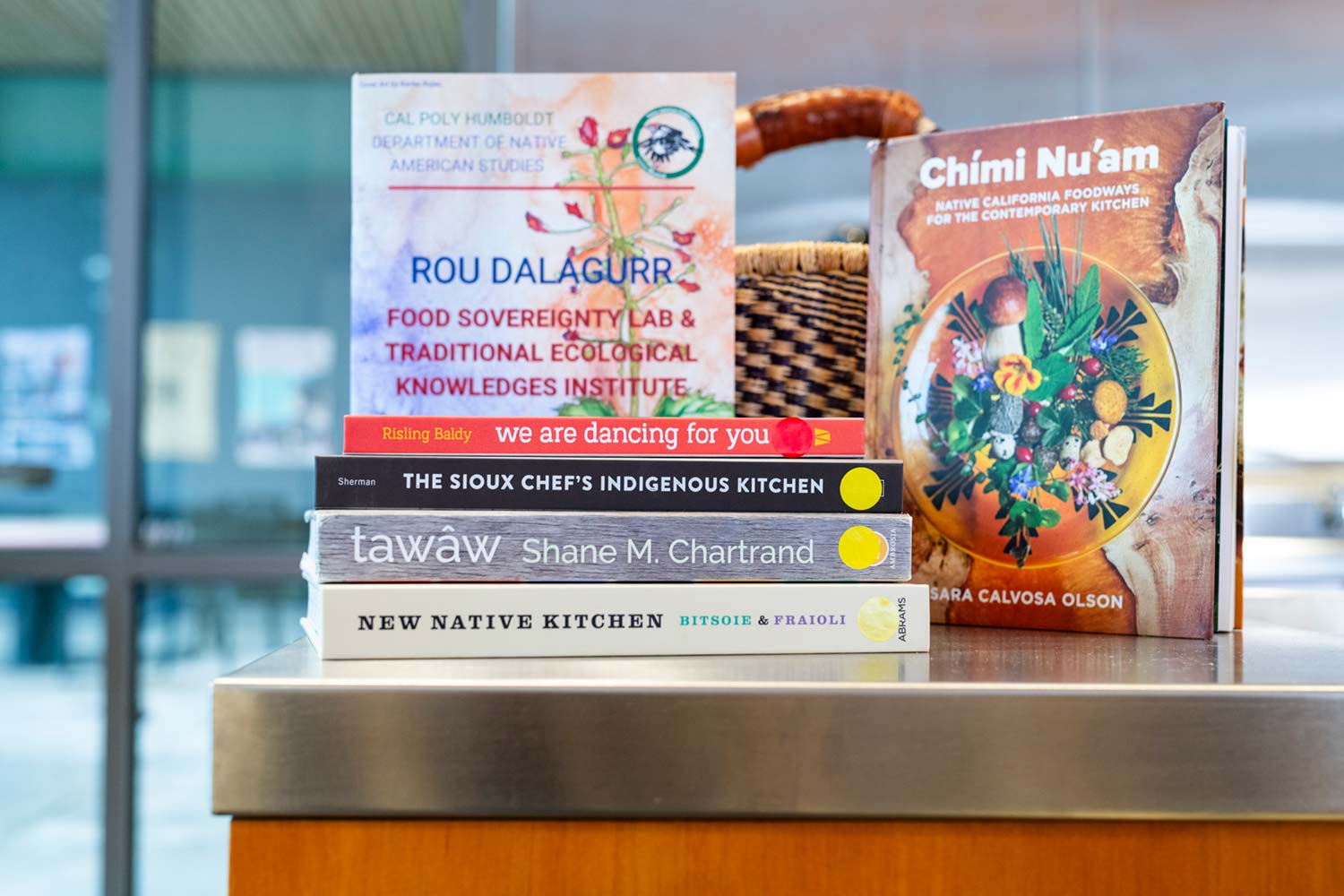
About:
The Rou Dalagurr: Food Sovereignty Lab & Traditional Ecological Knowledges Institute’s Chef-in-Residence program is an annual fellowship where Indigenous Chefs are invited to the Food Sovereignty Lab to share their knowledge, host cooking workshops and presentations, and work directly with our students and community members.
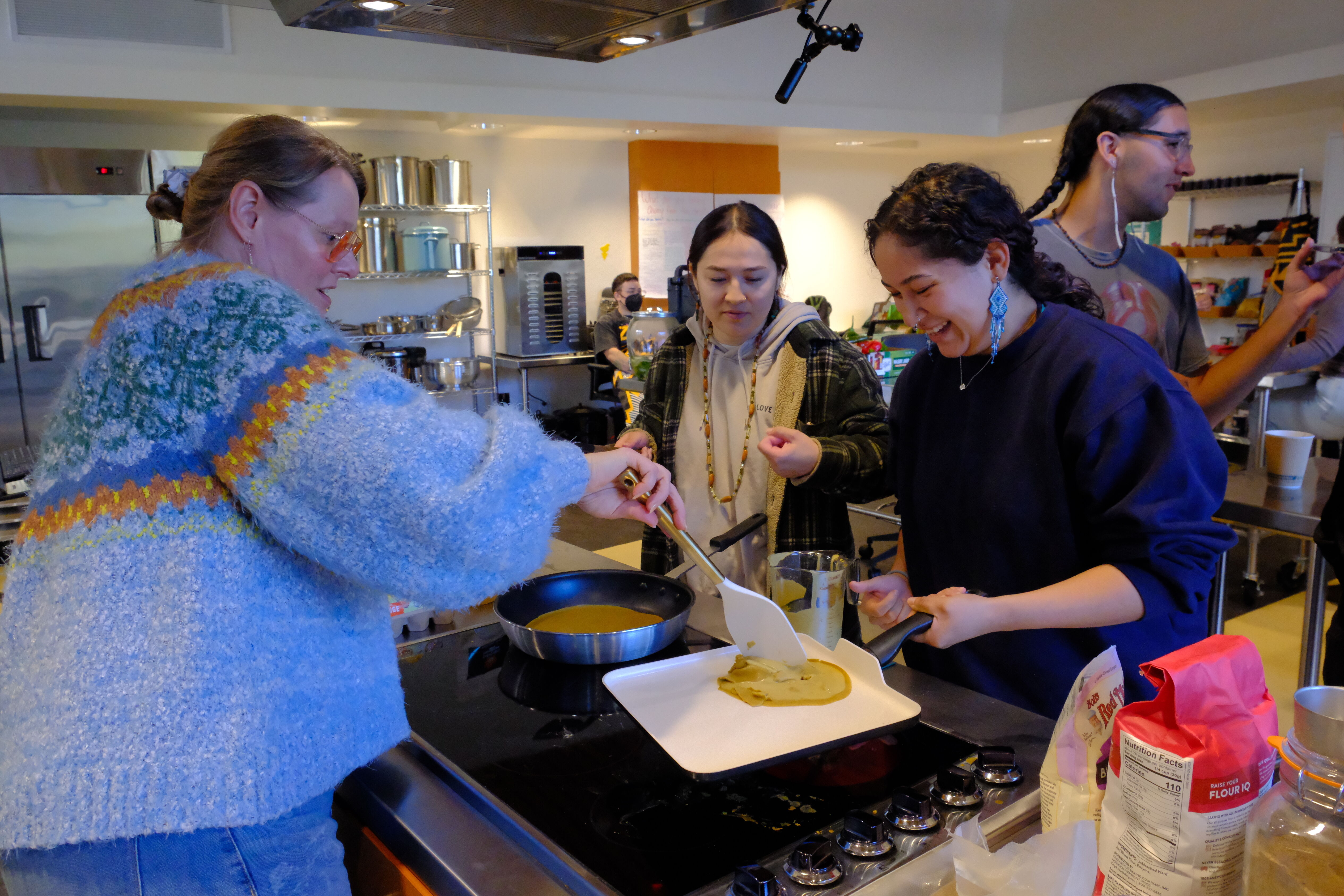
The primary goal of this program is to give our students, youth, community, and tribal elders opportunities to learn from Indigenous Chefs. We love to work with each Chef to make the programming their own, to think about new and creative ways to engage with the lab and to bring new ideas to the table. Our Chef-in-Residence program is flexible and can accommodate whatever time the Chef would like to give to the lab. Stay tuned for information on our next Chef-in-Residence for the 2025/2026 year!
Sample Chef-in-Residence Programming:
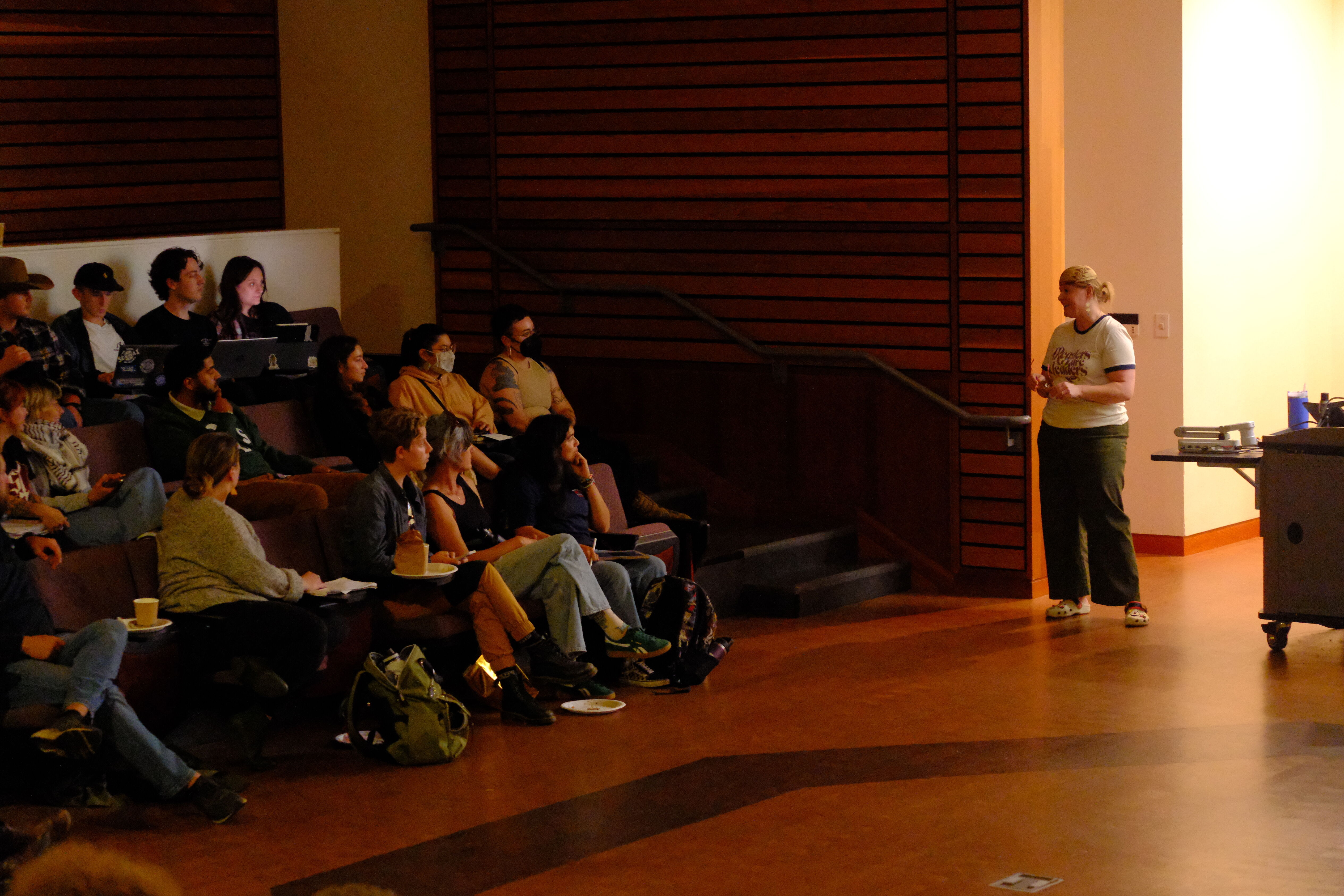
Fall:
- Days 1 & 2: Two Workshops
- Cooking workshop/demonstration for FSL staff at the Lab
- Cooking workshop/demonstration with FSL-associated students at the Lab
- Day 3: Community Talk/Presentation
- This would be open to the broader community and would be in our larger Native American Forum space. FSL staff would assist you in setting up a presentation about your work.
Spring:
- Research work with FSL staff members (2-3 days)
- One student workshop
- Time in the lab for work days as needed
The lab will provide all necessary cooking supplies and food items. We will also cover all of the travel and lodging expenses, as well as offering a $2,500 honorarium per semester for the important knowledge and time shared with the FSL community.
Upcoming FSL Chef-in-Residence 2025/2026
Details Coming Soon!
Our first Chef-in-Residence in Fall 2024 was Chef Sara Calvosa Olson! Sara Calvosa Olson (Karuk) is a food writer and author living on Huiman Coast Miwok Land. She is the author of Chími Nu’am: Native California Foodways for the Contemporary Kitchen (Heyday, 2023). Her work dwells at the intersection of storytelling, Indigenous food systems, security, sovereignty, reconnection, and recipe development. With an interest in using both culturally sound & faithfully updated techniques honoring traditional plants and animals, her cooking inspires a new look at the oldest foods in California.
Fall 2024 Events:
- Book Talk, October 16th at the Native American Forum
- Chef Sara Calvosa Olson talked with students and community members about her book Chími Nu’am: Native California Foodways for the Contemporary Kitchen at the Native American Forum on campus.
- The first 50 attendees were entered into a raffle to win a copy of Chími Nu’am!
- FSL/NAS Student Workshops, October 17th at the Food Sovereignty Lab
- Chef Sara Calvosa Olson taught students and community members how to make Acorn Crepes and Huckleberry Mini Muffins!
Spring 2025 FSL Chef-in-Residence:
- Book Talk, October 16th at the Native American Forum
- Chef Sara Calvosa Olson returned to the Rou Dalagurr Food Sovereignty Lab in Spring 2025 for direct programming with students and community members. She worked with graduate students and student interns on Indigenous recipes and cooking workshops, hosted small-group discussions, and presented about her work to our FSL Native Youth Council and students in the Huwighurruk Tribal Health Post Baccalaureate Program.
- Spring 2025 Events:
- Monday, March 17th: Chef Sara Calvosa Olson worked with graduate students on recipes
- Tuesday, March 25th, 3:30 - 5:00 p.m.: Chef Sara Calvosa Olson hosted a discussion with students in the Huwighurruk Tribal Health Post Baccalaureate Program
- Wednesday, March 26th: Chef Sara Calvosa Olson presented and cooked with FSL Kelp Guardians Interns
- Friday, March 28th, 11:00 a.m. - 2:00 p.m.: Chef Sara Calvosa Olson presented and cooked with the FSL 333 Class
- Tuesday, April 1st: Chef Sara Calvosa Olson worked with graduate students on Indigenous Recipes
- Wednesday, April 2nd, 6:00 - 7:00 p.m.: Chef Sara Calvosa Olson hosted a discussion with the FSL Native Youth Council
- Friday, April 4th, 5:30 - 7:30 p.m.: Chef Sara Calvosa Olson hosted a cooking workshop with the FSL Youth Council
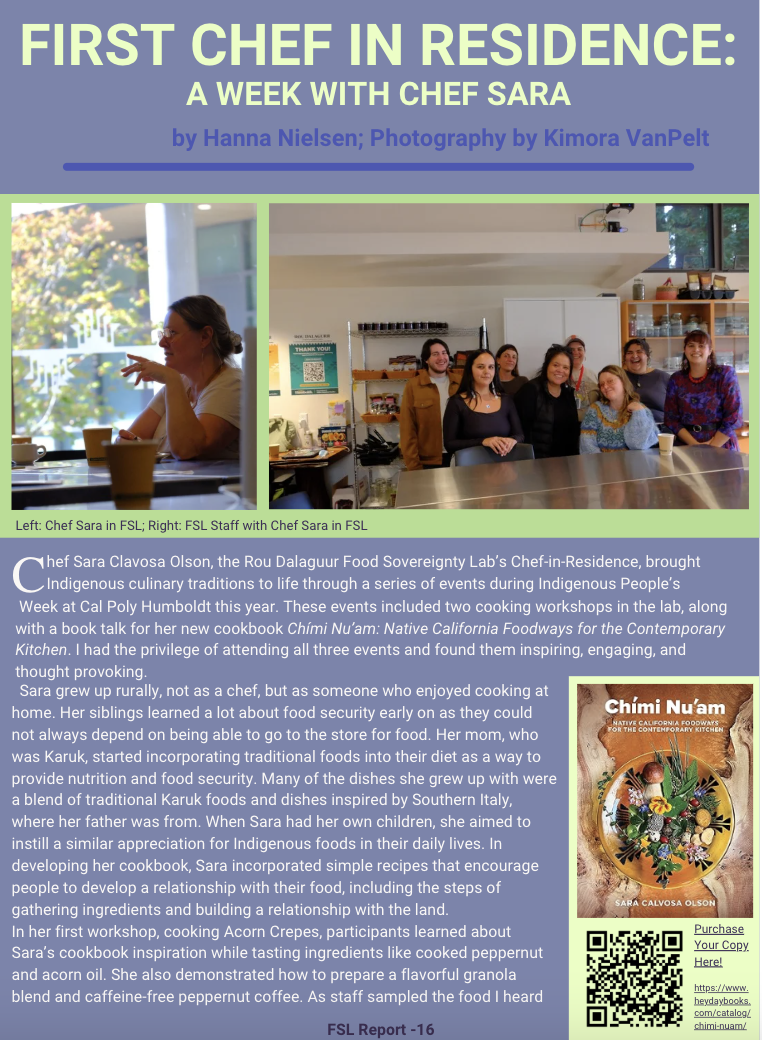
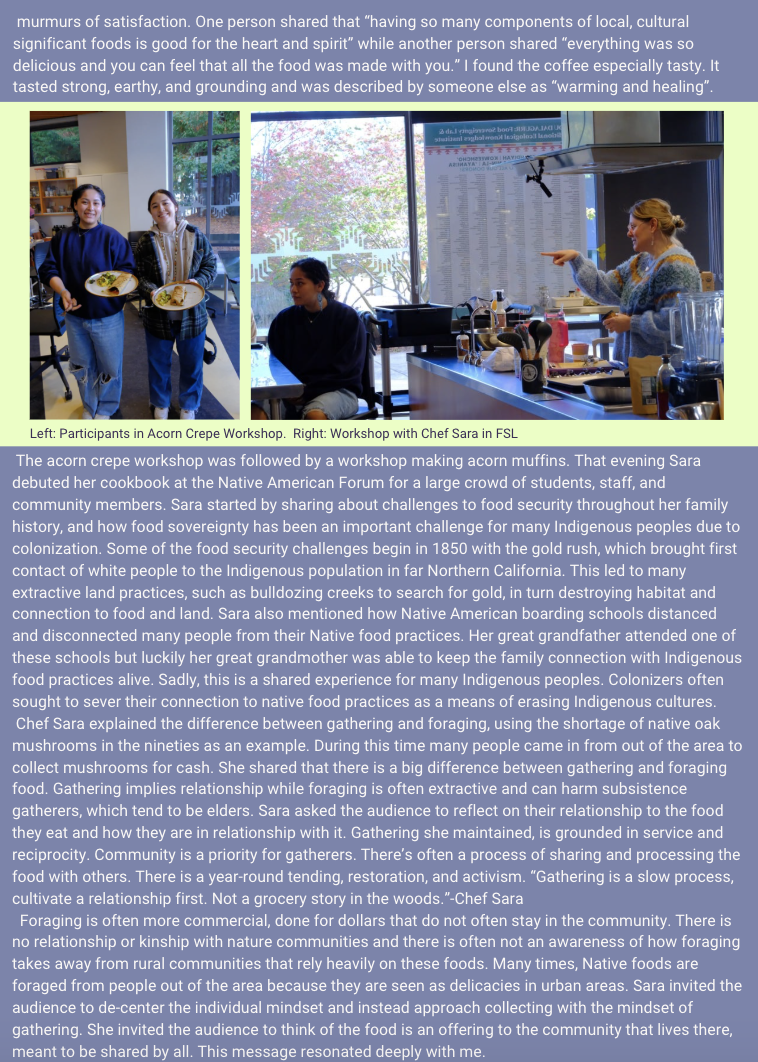
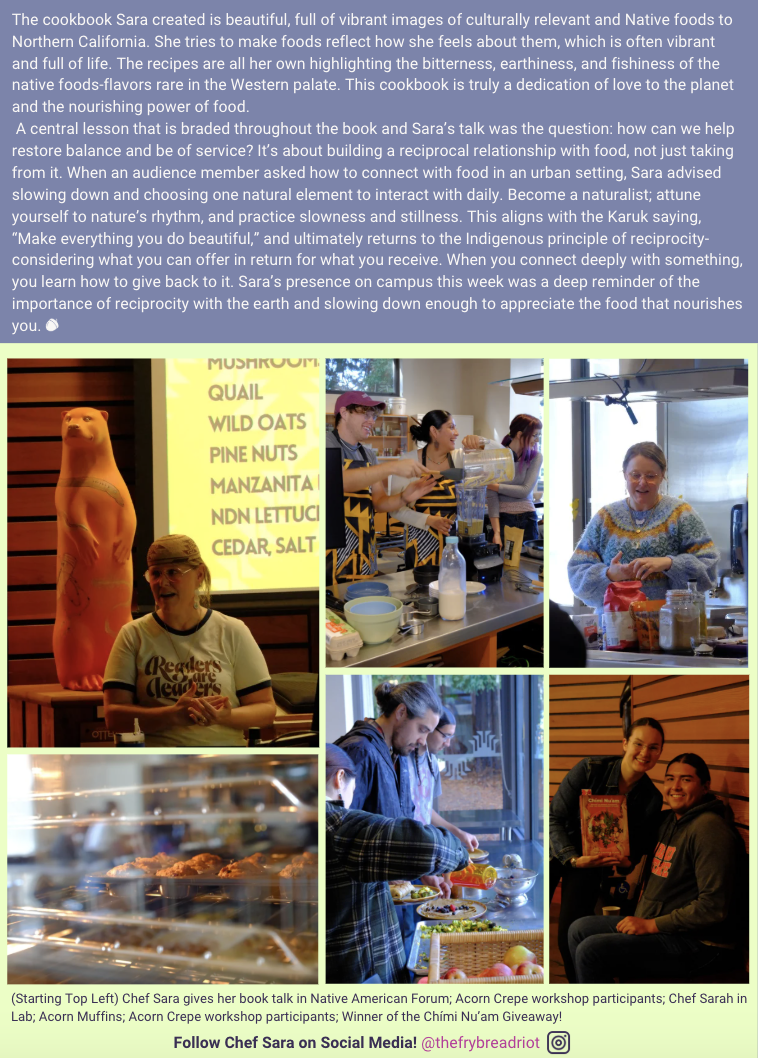
First Chef in Residence: A Week With Chef Sara
Written by Hanna Nielsen
Photography by Kimora VanPelt
Original publish date: October 2024
Chef Sara Calvosa Olson, the Rou Dalaguur Food Sovereignty Lab’s Chef-in-Residence, brought Indigenous culinary traditions to life through a series of events during Indigenous People’s Week at Cal Poly Humboldt this year. These events included two cooking workshops in the lab, along with a book talk for her new cookbook Chími Nu’am: Native California Foodways for the Contemporary Kitchen. I had the privilege of attending all three events and found them inspiring, engaging, and thought provoking. Sara grew up rurally, not as a chef, but as someone who enjoyed cooking at home. Her siblings learned a lot about food security early on as they could not always depend on being able to go to the store for food. Her mom, who was Karuk, started incorporating traditional foods into their diet as a way to provide nutrition and food security. Many of the dishes she grew up with were a blend of traditional Karuk foods and dishes inspired by Southern Italy, where her father was from. When Sara had her own children, she aimed to instill a similar appreciation for Indigenous foods in their daily lives. In developing her cookbook, Sara incorporated simple recipes that encourage people to develop a relationship with their food, including the steps of gathering ingredients and building a relationship with the land. In her first workshop, cooking Acorn Crepes, participants learned about Sara’s cookbook inspiration while tasting ingredients like cooked peppernut and acorn oil. She also demonstrated how to prepare a flavorful granola blend and caffeine-free peppernut coffee. As staff sampled the food I heard murmurs of satisfaction. One person shared that “having so many components of local, culturally significant foods is good for the heart and spirit” while another person shared “everything was so delicious and you can feel that all the food was made with you.” I found the coffee especially tasty. It tasted strong, earthy, and grounding and was described by someone else as “warming and healing”.The acorn crepe workshop was followed by a workshop making acorn muffins. That evening Sara debuted her cookbook at the Native American Forum for a large crowd of students, staff, and community members. Sara started by sharing about challenges to food security throughout her family history, and how food sovereignty has been an important challenge for many Indigenous peoples due to colonization. Some of the food security challenges began in 1850 with the gold rush, which brought first contact of white people to the Indigenous population in far Northern California. This led to many extractive land practices, such as bulldozing creeks to search for gold, in turn destroying habitat and connection to food and land. Sara also mentioned how Native American boarding schools distanced and disconnected many people from their Native food practices. Her great grandfather attended one of these schools but luckily her great grandmother was able to keep the family connection with Indigenous food practices alive. Sadly, this is a shared experience for many Indigenous peoples. Colonizers often sought to sever their connection to native food practices as a means of erasing Indigenous cultures. Chef Sara explained the difference between gathering and foraging, using the shortage of native oak mushrooms in the nineties as an example. During this time many people came in from out of the area to collect mushrooms for cash. She shared that there is a big difference between gathering and foraging food. Gathering implies relationship while foraging is often extractive and can harm subsistence gatherers, which tend to be elders. Sara asked the audience to reflect on their relationship to the food they eat and how they are in relationship with it. Gathering, she maintained, is grounded in service and reciprocity. Community is a priority for gatherers. There’s often a process of sharing and processing the food with others. There is a year-round tending, restoration, and activism. “Gathering is a slow process, cultivate a relationship first. Not a grocery story in the woods.”-Chef Sara Foraging is often more commercial, done for dollars that do not often stay in the community. There is no relationship or kinship with nature communities and there is often not an awareness of how foraging takes away from rural communities that rely heavily on these foods. Many times, Native foods are foraged from people out of the area because they are seen as delicacies in urban areas. Sara invited the audience to de-center the individual mindset and instead approach collecting with the mindset of gathering. She invited the audience to think of the food as an offering to the community that lives there, meant to be shared by all. This message resonated deeply with me. The cookbook Sara created is beautiful, full of vibrant images of culturally relevant and Native foods to Northern California. She tries to make foods reflect how she feels about them, which is often vibrant and full of life. The recipes are all her own highlighting the bitterness, earthiness, and fishiness of the native foods-flavors rare in the Western palate. This cookbook is truly a dedication of love to the planet and the nourishing power of food. A central lesson that is braided throughout the book and Sara’s talk was the question: how can we help restore balance and be of service? It’s about building a reciprocal relationship with food, not just taking from it. When an audience member asked how to connect with food in an urban setting, Sara advised slowing down and choosing one natural element to interact with daily. Become a naturalist; attune yourself to nature’s rhythm, and practice slowness and stillness. This aligns with the Karuk saying, “Make everything you do beautiful,” and ultimately returns to the Indigenous principle of reciprocity considering what you can offer in return for what you receive. When you connect deeply with something, you learn how to give back to it. Sara’s presence on campus this week was a deep reminder of the importance of reciprocity with the earth and slowing down enough to appreciate the food that nourishes you.





